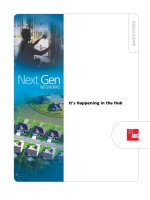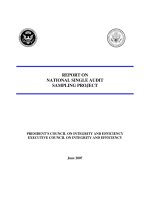It’s My Choice:Minnesota Governor’s Council on Developmental Disabilities pdf
Bạn đang xem bản rút gọn của tài liệu. Xem và tải ngay bản đầy đủ của tài liệu tại đây (2.73 MB, 90 trang )
It’s My Choice
Minnesota
Governor’s Council on
Developmental Disabilities
It’s My Choice
by
William T. Allen, Ph.D.
William T. Allen
Allen, Shea & Associates
1780 Third Street
Napa, CA 94559
707. 258.1326
FAX 707. 258.8354
www.allenshea.com
Preface
It is hoped that the information in this guide is written in a way
that is easy to understand. This was done for several reasons:
n so that people with developmental disabilities who read,
can read it and use it;
n so that people who advocate for those who cannot read
can explain it more easily;
n so that we can all understand.
The activities and checklists contained in this guide have been
used in a variety of ways. Any of the materials can be copied or
changed to meet the needs of people in your area.
Table of Contents
Introduction 2
Individual Assessment 4
Listen to Me! 5
A Game Plan for You 18
Individual Plans 25
Individual Program
Planning Guide 26
Transition Planning Guide 31
Individual Employment
Planning Guide 41
Individual Checklists 48
The Place of My Own Checklist 49
The Housing Checklist 52
The Workplace Checklist 60
Staff Evaluation Form 65
Looking at My Own Life Quality 66
Ideas on Making Things Easier 78
Supporting Self Advocacy 82
1
Introduction
Hard choices, big decisions.
Are these the things I want to learn?
Is this the kind of work I want to do? Is this where I want to live?
How should I spend my money? Should I get married?
Have a family? What will I do when I retire?
These are some of the big decisions that all of us must make
at different times in our lives.
Then, there are those nagging little ones that become a
part of our everyday life.
Should I sleep for 10 more minutes? What should I wear?
Should I drive to work or carpool?
Should I drink another cup of coffee?
How about dessert? What’s on TV?
As hard as it may seem, none of us would give up the freedom
to make decisions in our everyday lives.
The first step
Family members, friends, social workers, service
coordinators, service providers and advocates
can help people with developmental disabilities
get the services and supports they need to:
n lead the lifestyles they prefer;
n be more independent; and
n be active members of the community.
They can do this by supporting people in their
freedom of choice.
This resource guide will look at ways that you
can help support freedom of choice for
people with developmental disabilities:
n Looking at individual needs
n Planning for services
n Evaluating services
n Making things more understandable
n Supporting self advocacy
An example One of the first checklists you will
find is the Individual Program Planning Guide.
If you decide to use it, the agenda you would
follow for the individual annual planning
meeting might look like this:
n Introductions Everyone who is attending
the meeting states who they are and how
they can help support the individual.
2
n Purpose of the meeting It is explained
that the purpose of the meeting is to share
information about strengths, needs, hopes
and dreams and to come up with some
plans that will help the individual move
towards a preferred lifestyle now and in the
future.
n Sharing information This is a chance for
the individual, family and friends, and those
who work with him or her to talk about
what is important to the individual and
what it takes to successfully support him
or her at home, at work and in the
community. This is a time to review some-
thing like the Individual Program Planning
Guide or Listen to Me, a PATH, or
an Essential Lifestyle Plan, etc. In addition,
the individual may have made an audio or
videotape of his or her ideas about the
future.
n Making plans This is the time to develop
plans for the next year which will help the
individual move towards his or her
preferred lifestyle at home, at work and in
the community. Everyone must agree on
them and the individual has the last word.
Other considerations It is hoped that you
decide to use these checklists and activities in
your work. There are a few additional things
to remember when adapting them to the needs of
people with developmental disabilities in your
area:
n Language differences You might want to
have the materials translated into different
languages.
n Ethnic-cultural differences You might
want to consider where to hold the home
interview, planning conference, etc. based on
personal preferences.
n Procedural differences Agencies have
different procedures regarding planning and
evaluating services, etc. These materials
can be cut and pasted to work around those
differences.
3
What is person-centered
planning?
Person-centered planning isn’t so new and it
isn’t hard to do. It’s really as easy as listening to
people with developmental disabilities (or their
families if someone is very young) about things
like:
n where to live;
n how to spend time each day;
n who to spend time with; and,
n hopes and dreams for the future.
It’s also about supporting people in the choices
they make about their life. That can be the
hard part!
Individual Assessment
4
More about person-
centered planning
Planning ahead
We all have hopes and dreams for the future.
Some we can work for on our own, many take
support from others. Some will happen, some
will not.
Person-centered planning is one way of figuring
out where someone is going (life goals) and
what kinds of support they need to get there.
Part of it is asking the person, their family,
friends and people who work with him or her
about the things she or he likes to do
(preferences) and can do well (strengths and
capabilities). It is also finding out what things
get in the way (barriers) of doing the things peo-
ple like to do. If people can’t talk for them-
selves, then it’s important to spend time with
them and to ask others who know them well.
Important things to remember about
person-centered planning are:
n people with developmental disabilities (or
their families and friends if they can’t speak
for themselves) are in the driver’s seat; and,
n it’s about supporting the many different
ways that people choose to live.
What is this workbook about?
In this workbook, you will have a chance to think about your life and the kinds of
things that are important to you. When you’re done, you will have finished Listen
to Me! This information can be used to help build your Individual Program Plan
(IPP). On each page you will find a question and some words about what it means.
It’s best to do this workbook with people who know and care about you.
Remember, this is just one way to start the person-centered planning process.
Listen to Me!
This workbook belongs to:
Do you have a
photograph of yourself?
Put it in the frame!
5
Who is a part of your life?
Who are the people you are close to? people in your family? people at work or
school? neighbors and friends? Who are the people you do things with? talk to?
turn to for help?
Who do you spend the most time with? Who are the people who know you best?
Who are the people who are most important to you?
These are people who you might want to invite to your person-centered
planning meeting. Or, they might be able to support you in your plans for
the future.
Think about who they are and write their names in these circles. Some people write
the names of people who are closest to them in the middle, but you can do it any
way you want.
Here are some things to think about
when you’re working on Listen to Me:
n Pick a place to work where you are
comfortable;
n Invite people who know and care about
you (your friends, relatives, neighbors,
service coordinator, service provider) to
meet with you and help you fill out the
workbook; and
n When you get together, make sure
everyone knows each other and that
they’re there to support you;
6
You
What are some great things about you?
What are some great things about you? What do you like about you?
What are some things you're good at? proud of? What are some nice things that
people say about you? What do people thank you for? This is sometimes hard for
people to answer, so you might want to start by asking a friend or relative.
These are important things to think about when you are figuring out
the kinds of services and supports you need and want. List them here:
Here are some things to think about when
you’re working on Listen to Me:
n Someone should lead the meeting and
someone should write down what you
and your team say in the workbook;
n The person who leads the meeting should
make sure everyone gets a chance to talk
and that people listen;
n Have a good time, be positive; and,
n Ask the person who was writing things
down to go over them with you to make
sure everything is just like you want it.
7
What things do you like to do?
List your favorite things . . .
8
To help you get started on your lists, ask
yourself and people who know you:
What things do you like to do? at home?
at work? at program? at college? for fun?
around town? on vacation?
What kind of music do you like?
What kind of movies do you like?
What kind of food do you like?
Do you have any hobbies?
Do you collect things? What are the things you
don’t like or don’t like to do?
Did you do something before that you liked to
do (like a class or a job)?
What things don’t you like to do?
List things you don’t like or don’t like to do . . .
9
10
The week day
What do you do when you first get up?
What does your Monday through Friday morning look like right now?
What do you eat for breakfast? When do you leave for work?
Next, what would be your best Monday through Friday morning? If you could be
doing anything, what would it be? Finally, what would be your worst
Monday through Friday morning? What kinds of things make you mad, sad,
frustrated in the morning? What kinds of things bug you when you first get up?
What do you do when you first get to work or program or school?
What kinds of work or activities do you do now? Next, what would be your best
Monday through Friday? If you could be doing anything, what would it be?
What kinds of activities make you happy? Who would you do them with?
Finally, what would be your worst Monday through Friday?
What kinds of things make you mad, sad, frustrated during the day?
What places (or people) would you like to stay away from?
What do you do when you first get home?
What do you have for dinner? What kinds of activities do you do now?
Next, what would be your best Monday through Friday night? If you could be doing
anything, what would it be? What kinds of activities make you happy?
Who would you do them with? Finally, what would be your worst Monday through
Friday night? What kinds of things make you mad, sad, frustrated during the
evening?
The best week day would be
11
Your week day right now The worst week day would be
What is different about the weekend?
First, what does your Saturday and Sunday morning look like right now?
Is there anything different about the weekend during the morning, in the afternoon,
evening?
Next, what would be your best Saturday and Sunday? If you could be doing
anything, what would it be?
Finally, what would be your worst Saturday and Sunday?
12
The best weekend day would be
13
Your weekend day right now The worst weekend day would be
14
What is most important to you?
Look back at the things you wrote down
or said when we talked about who is in
your life. What are the great things about
you? What are the things you like to do, and
what are your best and worst week day and
weekend?
What is most important for us to remember?
What things do you want to make sure are in
your life every day (like a cup of coffee
in the morning or a favorite friend)? What
things do you want to make sure are not in
your life every day (like a certain kind of music
or some food you can’t stand)?
How can we successfully support you with
those things that are most important?
At work? At program? Around town?
For fun? On the weekends?
15
What can we do to successfully support
you?
16
What are your hopes and dreams for
the future?
What would be your best future?
What do you want to do? What do you want in
life? Remember, there are no right or wrong
answers! Just take a few minutes and think
about what could be and don’t worry about
things that might get in the way. Where would
you live? by yourself? with others? What kind
of job would you have? What would you do for
fun?
17
Where do you live, work, play and who is
part of your life?
18
Your Game Plan Instruction
Book
This is a way for you to put your thoughts and
ideas about the future into one place, a game
plan for you. The best way to complete it is to
sit down with your family and friends and work
through the questions together.
When you meet together:
n Keeps things positive
n Take turns talking
n Respect everyone’s right to choose not
to talk
n Listen to one another, and ask questions
only to clarify
n Be respectful of each other’s ideas and
information
n Support one another
n If someone becomes uncomfortable or
upset, offer to meet again at a later time
n Set a date and time to talk again about
how the plan is working and how it might
need to be changed
n End the meeting with a positive summary
of what you talked about
A Game Plan for You
19
Who’s on your team?
Who are the people that you count on for support when you need it?
Who are the people you are close to? in your family? at work? neighbors and
friends? These will be people you can talk to along the way, people who can
provide support to you when you need it.
20
Where have you been?
What are some of the things that have happened in your life that really made a
difference? Things that you really remember like they were yesterday. Some of the
good times and the bad times. Your list could include: things about your family;
a favorite teacher or a favorite time in school; friends and relatives who are
important to you; or learning about something new.
Where are you now?
What are some of the words that describe your
life right now? Fun? Hard work? Happy?
Where are you living? Where are you working?
What do you do for fun? What kinds of support
do you need each day? Who helps support
you?
21
Where are you going?
Where do you see yourself in the next 3-5 years? Where will you be living?
What will you be doing for school, work or training? What will you do for fun?
What kinds of support will you need?
22
What would help most right now?
Looking at the Where you are going? section, what kind of information or support
do you need to move towards your future. What do you need to do or know more
about in order for your plan to be successful?
What might get in the way?
It’s important to try to figure out some of the
things that might get in the way of your plan.
If you catch them fast enough, you can get rid
of them before they create a mess. This list
might be about money, or more information that
you need, or someone who is not on your team.
After working on this part, you might think of
other things to put on your list of What would
help most right now?
23
What are some first actions?
What could you do to get the most help right
now, to move towards where you want to go
and get rid of what might be in the way?
Do you need to make an appointment with your
service coordinator, look at local work services,
find a new place to live?
Who could help?
Are there people who are not on your team who could help support your game
plan? These might be people with information you need or people in the
community who can help you make new connections. List them here!









